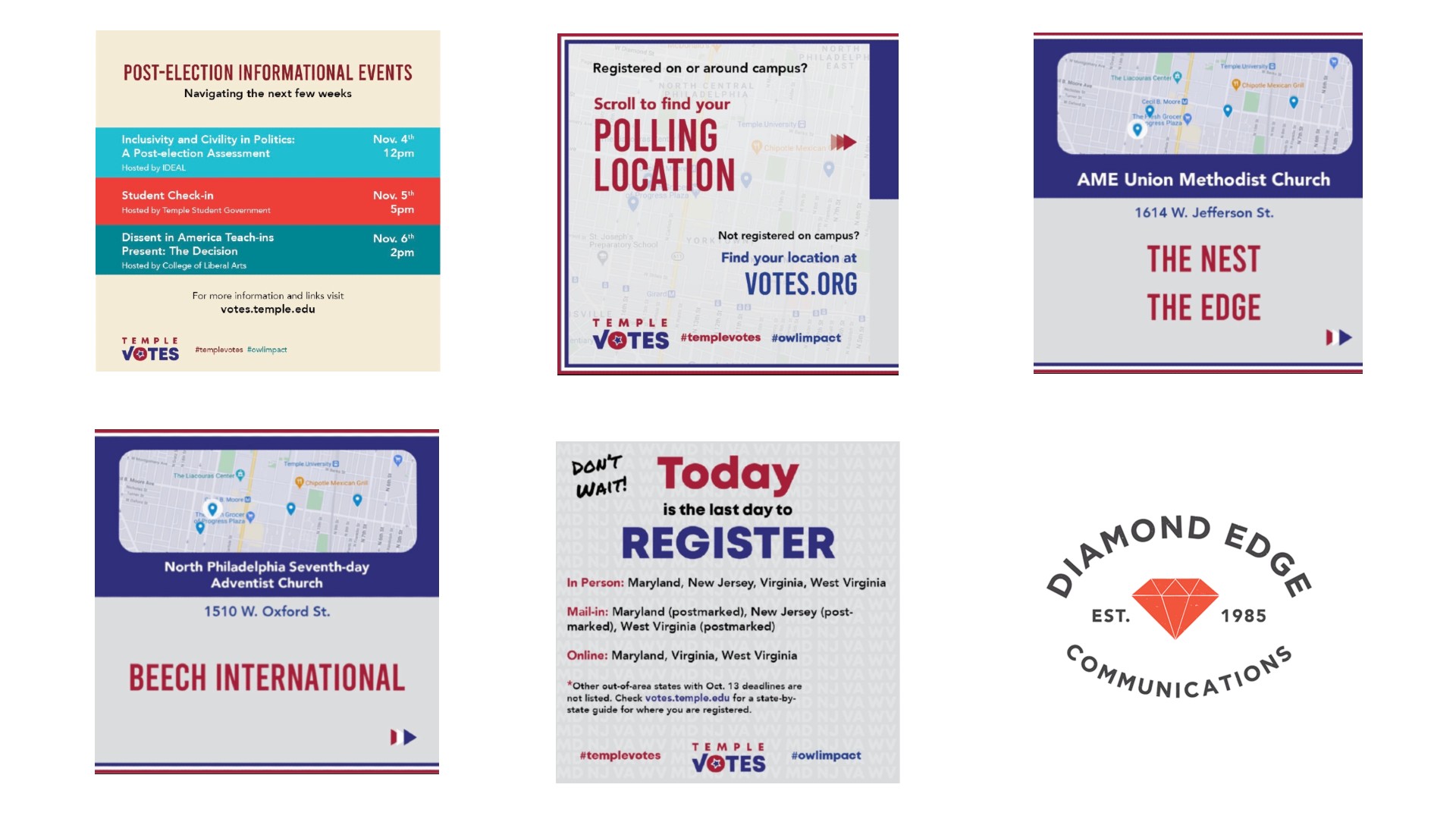While no one could have possibly planned for a global pandemic, Senior Associate Dean of Students Chris Carey was anticipating a lot of excitement surrounding the 2020 presidential election. That’s why he jumped at the opportunity to partner with Diamond Edge Communication (DEC), a student-run advertising agency at Klein College of Media and Communication, to develop centralized messaging for students on how to register and get involved in the voting process. As a result of the students’ hard work, Temple University has been named a Voter-Friendly Campus jointly by NASPA — a professional association for student affairs field — and the Campus Vote Project, which aims to boost civic involvement among students across the country.
Stacey Harpster is the faculty director for DEC, and has been for the past academic year. While she said that DEC has worked with a wide range of clients in the past, the organization is beginning to focus its efforts on nonprofits and businesses with humanitarian, civic and environmental values at their core. Thus, partnering with Temple Votes, the university’s first centralized informational hub on voting, was the perfect opportunity. The connection was facilitated by Klein’s Assistant Director for External Affairs Kalie Wertz, who immediately saw the potential for an impactful and educational experience for both the student and wider Temple community through both Carey and Harpster’s vision.
“I want to just expose students to using their advertising skills and talents for good,” Harpster said. “So any way that we can benefit the community or work with a business that has a social impact mission, is what I hope to do.”
This aligned closely with the goals of Temple Votes, and so the campaign got started right away in September during the Fall 2020 semester. Carey said he knew that there would be an onslaught of content that was biased, inaccurate or misleading crossing students’ paths, and he saw this project as a way to counter that.
“Knowing that there was going to be a lot of information, a lot of misinformation, a lot of first-time voters — we really wanted to create a central resource for students that was branded with Temple information, had a temple.edu site, all the sort of things where students knew they could just get information,” he said. “Really we wanted to try to create a resource to get students registered, educated and activated in the voting process.”
With such a timely, impactful cause, the students involved were eager to hit the ground running. In fact, getting their hands dirty right away was somewhat of a necessity because the election was so imminent. So, within a few days of getting to work, their first assignment was due. This quick-turnaround workflow characterized the project, and the students said it served as helpful practice for entering the agency world.
“It was very, very different from any other project that I did just because it was so fast-paced,” said Kayla Vining, KLN ‘21, who served as the account manager for the Temple Votes project. “It was such important work for us to do, especially with this past election, it really made me feel like I was making a difference in the Temple community.”
Julia Mammone, KLN ‘21, served as the art director for the Temple Votes project. Art direction and graphic design are long standing passions of Mammone’s, and she is looking forward to going into that field now that she has graduated. For that reason, taking on the art director role with Temple Votes helped prepare Mammone for her future aspirations.
“One thing I’m really proud of with our team is that we worked so well together; that we really took the reins and had primary communication with our client,” Mammone said.
She added that the Voter-Friendly Campus recognition was a sort of confirmation that their efforts were successful. With over 3000 unique page views and dozens of registrations just from the one webpage, Mammone considers the project a success.
“This was basically solidifying that what we were doing was working, and that people were actually taking the initiative to become part of the community and really using their voice to vote,” she said. “Our main goal was really to get students motivated and active within voting, and just be a part of it,”
Carey agrees, and even requested that he be able to use DEC’s social media graphics and other assets in years to come. The Voter-Friendly Campus designation lasts through 2022, when the university will have to begin the process over again.
“It's such a great opportunity to use student experts,” Carey said. “Not just the PR work, but the student perspective was so valuable for us.”

